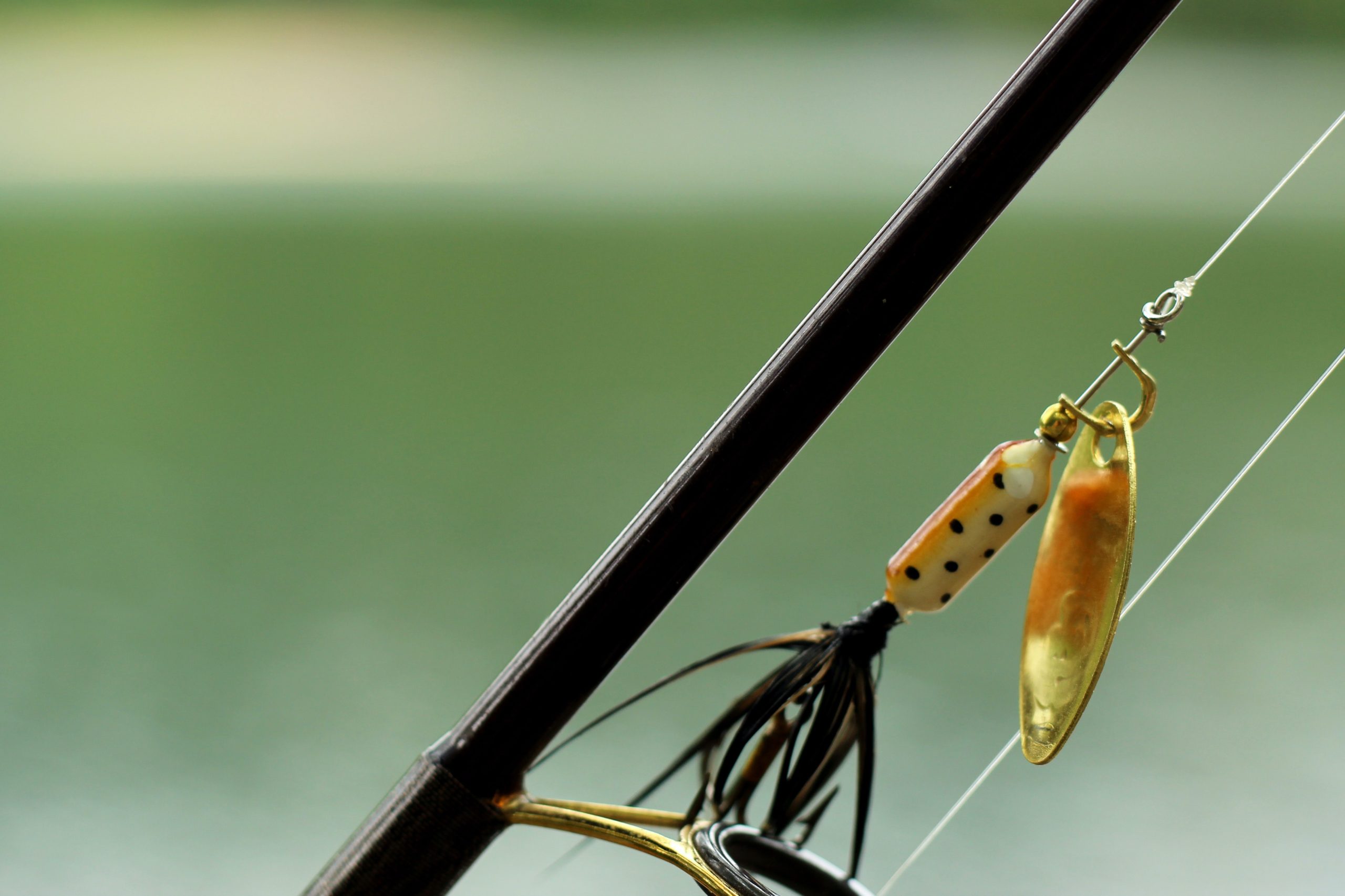Last Updated on October 10, 2022 by admin_hunter
What is Jerkbait?
It is around a lure that appears in the horizontal position. When the jerk bait is fished using a straight recoup, it shimmies.
Its tiny stature enables it to go through hard structures that can be trap spots for the fish you’re pursuing. When you’re fishing in places like these, a jerk bait is appropriate:
- Mid-lake structures, rocky shores, and points are common.
- Beds of sand and grass
- Drop-offs and ledges
- On docks
- Still water
A jerk bait may also have a lip or a beak as a crankbait. However, the cost of jerk bait is less than that of a crankbait.
How to Fish a Jerkbait
A jerkbait is a horizontal presentation minnow. The jerkbait swims with a shimmying motion thanks to the jerking action. A jerkbait is ideal for catching fish, but it shines on a snap-pause retrieve, which produces an erratic darting motion that attracts bass nuts.
Tweak The Retrieve
There are several ways to fish a jerkbait. Some people like the retrieve to be more of a sideways than a downward snap. Mixing things up with your retrieve mechanics might also help prevent arm fatigue. Make a small cast before attempting various retrieves to ensure that the lure has good action.
When fishing various models, such as shallow-, mid- or deep-diving jerkbaits, altering your retrieve style and cadence can be beneficial. Jeff Gustafson, for example, points to the Jackall DD Squirrel’s deep-diving capabilities. “Rather of using the typical twitch-twitch-pause retrieval, try a pull-pull-pause technique for this bait. “You don’t want to tear it apart as much as you pull it. It’s a more subtle bait.”
Tempo is adjusted to match the temperature.
When a fish is lethargic, move the jerkbait slowly and use long pauses to imitate slow fishing. Experiment with how fast you jerk a jerkbait and how long it’s paused to match the mood and activity level of the fish. In general, the colder the water is, the faster it travels and the more forceful the snap and pause. The swimmer makes a surface chop to the side of the breast, which immediately elicits reaction strikes. In general, it’s best to take it easy in cold water. Assertive snaps may be effective, but they should be extended by delaying.
Fish the Conditions
“I’m a typical jerk-jerk-pause kind of guy. I’ll begin with that and, if it doesn’t work, I’ll start experimenting with different rhythms,” said Stephen Browning.
The key is to avoid becoming locked in a pattern. Begin with a retrieve cadence that has previously shown to be successful, but be prepared to modify until bass bite.
Milk It in the Strike Zone
The term “milk it” is used by jerkbait expert Mike McClelland to describe when he slows down a jerkbait retrieve and adds time. When going after suspending Spro McStick 110 for pre-spawn bass that aren’t feeding aggressively and are hanging in 8 to 12 feet of water, he employs a technique. The McRip 85 will be his preferred deep-diving rod at this depth.
What’s Stickbait?
The word “stick bait”, which you will not discover in the dictionary, was quite obscure to many anglers not long ago, more so in the U.S. Stick baits, on the other hand, have been around for a long time. However, in recent years, there has been increasing recognition of and call for stick baits.
What is about a stick bait that makes it one?
The answer is determined in part by what someone is looking for. Stick baits have long been popular amid anglers fishing in the Australasian Pacific.
It’s become popular among bass anglers to call a worm-caster. It is also used to relate straight worms, basically, little cigars of pulpy plastic, which are being utilized by freshwater bass fishermen more frequently.
In the least, stick baits are wood lures or hard plastic in heavy saltwater usage. To acquire a deeper knowledge of the lures, I interviewed several lure-producers and skippers with stick bait prowess and requested them to explain the phrase.
Most folks appeared to be on the same wavelength. Finally, I added on a few of my modifications to produce this as perhaps the first produced clarity of stick bait:
A plastic lure with a taper and streamlined shape that submerges or hangs is spread a long stretch by a fisher who may give different movement and speeds during the recoup.
Note the following “tapered, streamlined” characteristics: Stickbaits lack a bill that may be used to generate action. A minnow lure, on the other hand, would be considered a jerk bait.
While many people think of floating lures as stick baits, I’ve gone with the term “surface plugs,” which are generally walk-the-dog types.
Works of Art
Although some experts claim that the previously mentioned lures do not have built-in measures, many makers nowadays create stick baits with side-to-side shimmy when recouped at a constant speed. Stickbaits work best when cast, retrieved, and pitched similarly. Depending on the lure design, this is particularly important for straight stick baits like the Nomad Design creation by Damon Olsen.
Stickbaiters, on the other hand, make considerable use of steady retrieves and long rod sweeps with lengthy pauses or quick, forceful jerks with brief stops according to the situation, species, and overall angler preference.
Strikes on retrieves may be excruciating.
Stickbaits have been made by hand for many years, although they are becoming increasingly desired. These fishing lures were often beautiful in appearance and craftsmanship, with painters creating not just normal lures but one-of-a-kind art that fetched high prices.
Mass-produced stick baits in a range of prices will suit many tackle boxes. These are also known for their striking, frequently eye-catching finishes/ending, as if to make up for their typically unadorned appearance. Stickbaits are probably the most misused lure among rough game fish, making them a good choice for use through the wire.
Stickbaits are weighty for their shape and size since stickbaiters prefer long throws. They’re also, as Merv Rubiano of Strategic Angler Custom Lures notes, most often packed forward or aft, further increasing the cast. They’re also among the easiest bats to throw in a blow. Even against a strong wind, they’re easily launched. Stickbaits with long casts have the upper hand over baitfish because each retrieval covers a large amount of water.
“When a well-presented stick bait is used with expertise by the fisher, it can elicit a deep, primordial response from a predator,” Jason Ward of Siren Lures says.
Can Be Used to Fish Tuna
They are still very fashionable among tuna anglers who engage in the run-and-gun games, pursuing fish after baitfish on top. Some of the more difficult targets that boats may encounter are schools. These provide thrilling but often frightening objectives for boats to attempt to reach. A high-quality stick bait can be spread a long distance, then offered a fast-fleeing performance that lures predators to the scene of the fight.
In the Northeast, large, straight stick baits are increasingly popular for bluefin — as are tuna lovers Down below in southeastern Australia, running after titanic southern bluefin. (Rubiano adds, When tuna munch on sand eels, a long, thin stick bait may outperform a leveled design.)
After yellowtail, stick baits have also caught on with Southern California piscators. Olsen says his Californian guides have reported ecstatic experiences. In Australia, for example, “Stick baits are popular with kingfish (southern yellowtail) lovers,” according to Chris Beldon of Rapala.

